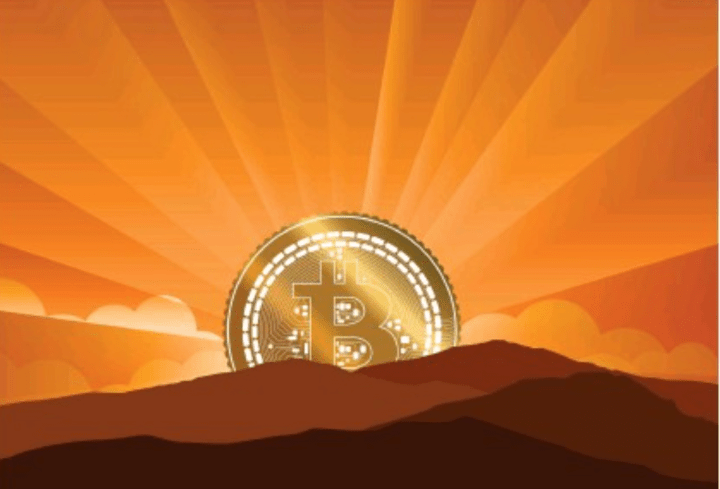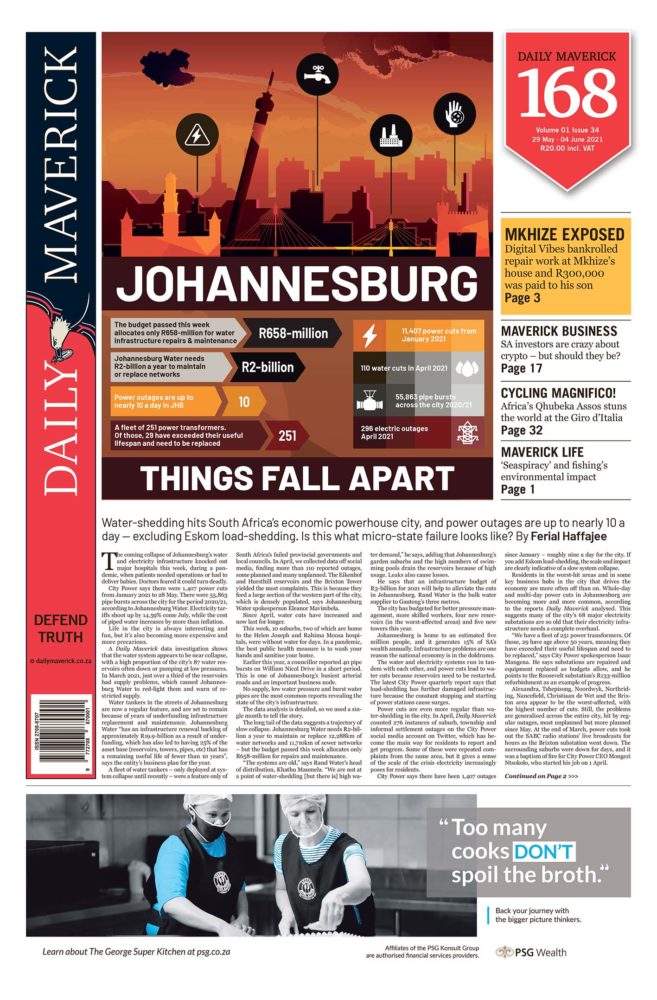BUSINESS MAVERICK 168
South African investors just love cryptos; asset managers less so

It has been a wild, wild fortnight for cryptocurrency investors, even by crypto’s standards of volatility. However, while a recent report released by Goldman Sachs suggests that institutional investors are increasingly seeing cryptocurrencies as an asset class, South African asset managers remain sceptical. The public, on the other hand, has no such compunctions.
First published in the Daily Maverick 168 weekly newspaper.
There is blood on the floor. Just 10 days ago the price of bitcoin swung by 30% in each direction after Chinese authorities vowed to tighten crypto regulations and crack down on bitcoin mining in the country. US regulators also weighed in and the price promptly fell as low as $30,016, down from $64,800 in April. Market noise and chatter has since been cacophonic but the price remains relatively subdued at $39,400 – though well up on the pre-pandemic price of $5,000.
Despite the crazy swings global investors like Ray Dalio and Cathy Woods, and institutions like BlackRock, JP Morgan, Goldman Sachs, Deutsche Bank, Morgan Stanley, Henyep Group, Square, MassMutual, Harvard, and Yale are increasingly convinced about the viability of cryptocurrencies as an asset class.
“Bitcoin is now considered an investable asset,” says Mathew McDermott, Global Head of Digital Assets at Goldman Sachs. “It has its own idiosyncratic risk, partly because it’s still relatively new and going through an adoption phase…. But clients and beyond are largely treating it as a new asset class, which is notable—it’s not often that we get to witness the emergence of a new asset class.”
South African investors have been climbing aboard in their droves. Roughly 60% of Luno clients (a cryptocurrency exchange launched in Cape Town, now owned by the Digital Currency Group) have no other investments. “Sadly some people panicked [as the price fell] , but most customers in bitcoin globally are in it for the long haul – you can see it in the price,” says Luno co-founder and CEO Marcus Swanepoel.
DCX Capital, a company founded by Earle Loxton and Michael Jordaan, has seen an exponential takeup of its cryptocurrency bundles, sold under the name EC10 via investment platform Easy Equities. DCX has about 75,000 clients, a number that has been growing at 20% per month on average since January this year, says Loxton. Its assets under management (AUM) across its EC10 bundles (a bundle of the top 10 crypto assets – Bitcoin, Ethereum, XRP and 7 more) is roughly R390-million (down from ±R500-million a month ago). “Although AUM has dropped with the price, our total bundles in circulation are growing by 20% per month. We expect to reach R1-billion AUM by the end of the year,” he says.
The product – its not a fund, an ETF or unit trust – as these are regulated vehicles and cryptos fall outside of the regulatory net, was developed in the face of growing consumer appetite for crypto assets.
“Institutions are becoming increasingly pressurised by their clients to offer crypto. Many people are not interested in buying coins from Luno or VALR and having to bother with keys and cold storage and 3rd party custody, they want their family office to take care of it all,” he says.
While SA regulations do not permit pension funds or wealth managers to invest client money in crypto assets, Loxton adds that DCX is far down the process to develop a “broker’s portal” and other institutional grade tools to enable the institutions, financial advisers, wealth managers to offer crypto when the regulations permit.
“Can we invest in crypto is the question we get asked most regularly by our clients,” says George Herman, CIO at investment management company Citadel. “But are we being pushed? Not at all,” he adds.
Cryptocurrencies can be labelled virtual assets that pay no interest or dividends, which is not necessarily bad in a world where interest rates are low, government debt is high and inflation is threatening. “Cryptos have zero intrinsic value, in the same way as art has no intrinsic value. Its value is determined by its unique characteristics and the network effect,” he says. “But cryptos have limited value as a diversification play because the price behaviour and correlation to traditional asset classes is not clear and impossible to model.”
Aside from regulation, the introduction of central bank digital currencies, which can be used to facilitate blockchain transactions, could undermine the efficacy of crypto and possibly even supersede cryptos…
Investment specialists at Allan Gray have researched cryptocurrencies to death. “We could argue that yes this is a new asset and we would not want to miss out on an investment opportunity for our clients,” says portfolio manager Jacques Plaut – who points out that the conversation is academic because cryptoassets are not regulated and hence fall outside of the permitted investment universe. That said, on whether the asset manager would invest if they could, “the conclusion so far is no,” he says. “Our game is not trying to be one step ahead of the crowd, which is what you need to make money in bitcoin. Our focus is on valuing intrinsic value and investing for the best returns.”
Adrian Pask, the CIO at PSG Wealth, has strong views on the subject. “There is way too much noise and hype in the crypto space. Wealth management is not speculation, it’s about growing wealth over time. The crypto market is too volatile to be a dependable asset, and this is when investors make mistakes. Wealth managers need to be more vocal about this.”
The question the investment gurus are asking, is what is bitcoin (and cryptocurrencies in general) investment proposition? Is it as a currency, a payment mechanism, a store of value – the digital gold that many are talking about?
Hywel George, the director of investments at Old Mutual, believes that crypto is an asset class that worth examining. However, he sees more value in crypto as a facilitator of blockchain technology, such as Ethereum, than as a store of value.
Ethereum is the blockchain-based, public software platform that facilitates peer-to-peer contracts, known as smart contracts, as well as decentralised applications, known as dApps. Ether is the currency that can be used to pay for goods and services and to support the development of applications on the Ethereum network.
“Crypto sits alongside these platforms as the facilitator, and you cannot dismiss that out of hand,” he says.
However he cautions that Nation States, which have until recently just been observing, are paying attention.
“One of the main levers of control, for nations, is money supply, the control of credit and management of inflation. Cryptos are threatening that and governments are starting to intervene.”
Aside from regulation, the introduction of central bank digital currencies, which can be used to facilitate blockchain transactions, could undermine the efficacy of crypto and possibly even supersede cryptos, he warns.
Much would have to change in the crypto world, least of all regulations before asset managers and wealth managers dive in. After all they are mandated by regulators, and entrusted by clients to protect, preserve and grow client capital.
But individual investors, freed from those constraints, seem more than willing to shoulder the risk in the hopes of a quick return. DM168
This story first appeared in our weekly Daily Maverick 168 newspaper which is available for free to Pick n Pay Smart Shoppers at these Pick n Pay stores.



















To call the purchase of cryptocurrency ‘Investment’ is a total travesty of the meaning of that word. It is SPECULATION, nothing more, nothing less. Can anyone provide me with evidence that crypto ‘investment’ produces anything at all other than capital gain – or, more likely, loss? That is not Investment, and the media are complicit in punting the idea that it is.
Hear hear.
I find it unfortunate that the focus of crypto reporting solely focuses on the price of the crypto assets, but the evolution of the underlying technologies goes unreported. Lets just be clear, I am not in finance and am not an expert by any stretch of the imagination. I find the whole crypto ‘space’ fascinating and try and educate myself as much as possible in what is happening.
It is my opinion that the next Google, Apple or Amazon of the world is being developed right now. I believe that over the next 5-10 years this technology will replace most of our current technologies, starting with the financial sector. How it will play out, I have no idea. it is still extremely early and most of these companies are still developing their products, but already real world use cases are appearing. I don’t want to mention names as I don’t want to seem like I am promoting one currency/platform or another.
I guess my point is there are massive investment opportunities out there. There is also a lot of nonsense out there, and a lot of these companies won’t survive (just like with the internet bubble) but it does not mean that the whole crypto space is just speculation.
Like I said, it is just my opinion.